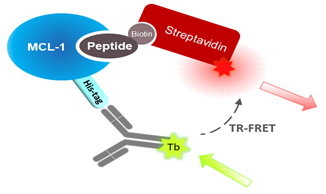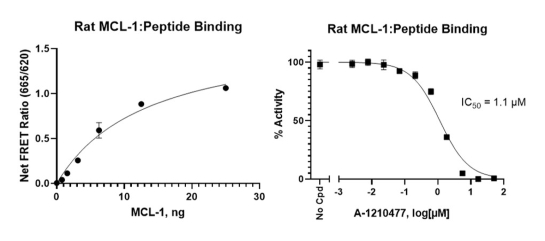MCL-1 TR-FRET Assay Kit (Rat)
The Induced myeloid leukemia cell differentiation protein (MCL-1) TR-FRET Assay Kit (Rat) is designed to measure the inhibition of rat MCL-1 binding to its ligand in a homogeneous 384-well format. This TR-FRET based assay requires no time-consuming washing steps, making it especially suitable for high throughput screening applications. The assay is straightforward and fast. The TR-FRET signal is measured after a 1-hour incubation of the anti-His terbium (Tb)-labeled donor, dye-labeled acceptor, recombinant Rat MCL-1 protein, peptide ligand, and the inhibitor of interest.

Figure 1: MCL-1 TR-FRET Assay Kit.
Need us to run inhibitor screens or profile your compounds against MCL-1(Rat)? Check out our Apoptosis Screening Services or DNA Replication and Repair Screening Services.
- Fluorescence microplate reader capable of measuring Time Resolved-Fluorescence Resonance Energy Transfer (TR-FRET)
- Adjustable micropipettor and sterile tips
| Catalog # | Name | Amount | Storage |
| 101299 | Rat MCL-1* | 5 µg | -80°C |
| 79507 | MCL-1 Peptide Ligand | 400 reactions | -80°C |
| 30017 | Anti-His Tb-labeled donor | 2 x 10 µl | -20°C |
| Dye-labeled acceptor | 2 x 10 µl | -20°C | |
| 3x MCL TR-FRET Assay Buffer | 4 ml | -20°C | |
| 79969 | 384-well white microplate | 1 | Room Temp |
*The initial concentration of Rat MCL-1 is lot-specific and will be indicated on the tube containing the protein.
Induced myeloid leukemia cell differentiation protein (MCL-1) is part of the BCL-2 family of proteins that regulates apoptosis. The intrinsic (mitochondrial) apoptotic pathway is activated by intracellular signals strictly controlled by the BCL-2 family of proteins and are grouped into the antiapoptotic, activator, and sensitizer subsets. All function through complex interactions to regulate the integrity of the mitochondrial membrane. As part of the antiapoptotic subset, MCL-1 inhibits mitochondrial outer membrane permeabilization (MOMP) and the release of cytochrome C from mitochondria. MCL-1 is essential for the survival of various cell types that include the nervous system, cardiomyocytes and lymphocytes. Overexpression of MCL-1 is frequently observed in many tumor types and is closely associated with tumorigenesis and drug resistance. Because of its ability to strictly regulate cell fate, MCL-1 is a target of interest for many drug therapies.


